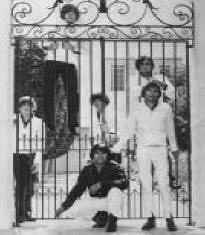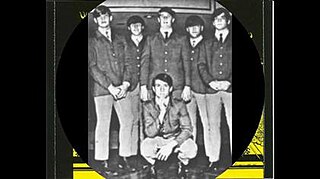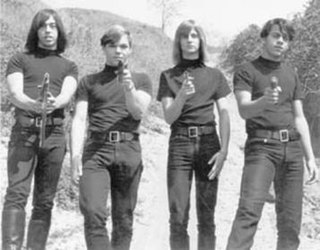
The Music Machine was an American rock band formed in Los Angeles, California in 1966. Fronted by chief songwriter and lead vocalist Sean Bonniwell, the band cultivated a characteristically dark and rebellious image reflected in an untamed musical approach. Sometimes it made use of distorted guitar lines and hallucinogenic organ parts, punctuated by Bonniwell's distinctively throaty vocals. Although they managed to attain national chart success only briefly with two singles, the Music Machine is today considered by many critics to be one of the groundbreaking acts of the 1960s. Their style is now recognized as a pioneering force in proto-punk; yet within a relatively short period of time, they began to employ more complex lyrical and instrumental arrangements that went beyond the typical garage band format.
The Litter was an American psychedelic and garage rock band, formed in 1966 in Minneapolis, Minnesota, United States. They are best remembered for their 1967 debut single, "Action Woman". The group recorded three albums in the late 1960s before disbanding, but they re-united in 1990, 1992, and again in 1998, when they recorded a new studio album consisting of both old and new material. All of their Minneapolis recorded material was produced by Warren Kendrick, who owned the Scotty and Warick and Hexagon labels.

The Chesterfield Kings were a rock band from Rochester, New York, who began as a retro-1960s garage band, and who have heavily mined 1960s music, including some borrowing from the 1960s recordings of The Rolling Stones. Core members were former Distorted Level singer, underground music journalist and avid record collector Greg Prevost, and Andy Babiuk ; others have come and gone. The band, named after a defunct brand of unfiltered cigarette, was instrumental in sparking the 1980s garage band revival that launched such groups as the Unclaimed, Marshmallow Overcoat, The Fuzztones, The Pandoras, The Malarians, Mystic Eyes, The Cynics, The Optic Nerve, the Secret Service, and the Stomachmouths.

The Amboy Dukes is the debut studio album by American rock band The Amboy Dukes. It was released in November 1967 on Mainstream Records. The Amboy Dukes interested a record label that primarily produced jazz albums. Ted Nugent assembled a new band of local Detroit players to secure a recording contract with them. He immediately brought in the soulful baritone voice of John (J.B.) Drake as lead vocalist. He had a long history with Drake in a local band called The Lourds. Nugent and Drake then recruited the remaining players. Steve Farmer was known as a rhythm guitarist, lyricist, composer and vocalist and was a natural fit with Nugent. He came from a local group called The Gang. Dave Palmer was a drummer and percussionist with experience in two local bands, The Galaxy Five and The Citations. Bill White played bass guitar and Rick Lober was an eclectic keyboardist rounding out the new group.

Big Brother & the Holding Company is the debut album of Big Brother and the Holding Company, with Janis Joplin, their main singer. Recorded during three days in December 1966 for Mainstream Records, it was released in the summer of 1967, shortly after the band's major success at the Monterey Pop Festival. Columbia took over the band's contract and re-released the album, adding two extra tracks, and putting Joplin's name on the cover. Several tracks on the album were released as singles, the most successful being "Down on Me" on its second release, in 1968.
Psychedelic pop is pop music that contains musical characteristics associated with psychedelic music. Developing in the mid-to-late 1960s, elements included "trippy" features such as fuzz guitars, tape manipulation, backwards recording, sitars, and Beach Boys-style harmonies, wedded to melodic songs with tight song structures. The style lasted into the early 1970s. It has seen revivals in subsequent decades by neo-psychedelic artists.

Ear-Piercing Punk is a compilation album issued in both LP and CD formats of obscure 1960s garage rock that was originally released on AIP Records in the late 1970s. As discussed on the AIP Records website and in reviews of the album during its initial release, the album was given the name "Ear-Piercing Punk" to try to market or turn this music, now often referred to as proto punk, on to kids just getting into punk rock for the first time as a result of the 1970s punk explosion. The purpose of the album was to show that punk had existed for quite a number of years prior to the generally accepted mainstream use of the term to define bands such as the Ramones, Sex Pistols and The Clash.

The Human Expression was an American garage and psychedelic rock band from Los Angeles that released three well-regarded singles, and made additional demo recordings between 1966 and 1967.
The Mystic Tide were an American rock band who have been credited for creating some of the first psychedelic anthems. Despite their lack of commercial success, they are now highly regarded amongst followers of garage rock and are recognized for their innovative musical approach.
"It's a Cry'n Shame" is a song written by Seab Meador and Mike Kelley and was recorded in 1966 by the Gentlemen, an American garage rock band from Dallas, Texas who were active between 1964 and 1968. It was originally released as the B-side to "You Can't Be True" but has become by far the better-known song. "It's a Cry'n Shame" has been included in several garage rock compilations and is now recognized as one of the greatest songs in the genre.

The Lemon Fog were an American garage rock/psychedelic rock band from Houston, Texas who were active from 1965–1970. They were one of the earliest bands to emerge from the Houston psychedelic scene, and recorded several singles for Orbit Records. The group also recorded a handful of outtakes and demos which, along with their issued singles, have been released on the anthology The Psychedelic Sound Of Summer With The Lemon Fog.

The Painted Faces were an American garage rock/psychedelic rock band from Fort Myers, Florida who were active from 1967 through 1969, who were not only popular in Florida but achieved a following outside of their own region by playing regular shows in New York City and elsewhere. After disbanding they became practically unknown for a number of years, but since the 1980s, with the reissue their songs on various compilations, they have come to the attention of garage rock and psychedelic devotees. They are known for songs such as "Anxious Color", which Mojo magazine named one of the top 100 psychedelic songs of all time.

The Liberty Bell was an American garage rock/psychedelic rock band from Corpus Christi, Texas who were active in the 1960s. They specialized in a blues-based brand of proto-punk influenced by British groups such as the Yardbirds. The band failed to reach wider audience in the time, but have come to the attention of garage rock collectors and enthusiasts in the intervening years since their breakup, with their work appearing on several compilations.

The Stillroven were an American garage rock and psychedelic band from Robbinsdale, Minnesota, outside of Minneapolis, who were active in 1965-1969. They became a local success, enjoying a hit in the Twin Cites area with their version of "Hey Joe". In hopes of reaching a wider audience they relocated, playing for a short time in Tucson, Arizona, but eventually moved their base of operations to Denver, Colorado, where they briefly signed to A&M Records, recording an unreleased album for the label. The group made recordings at Norman Petty's studio in Clovis, New Mexico, before moving to Washington, DC in 1969 and auditioning in New York City to secure another recording arrangement that never materialized. In the intervening years since their breakup in 1969, the group's work has attracted the attention of garage rock and psychedelic enthusiasts and has been included on various re-issues and compilations.
The Stumblin' Blox were an American garage rock band from Abilene, Texas who were active in the 1960s. They are known for songs such as "It's Alright." Though they failed to achieve commercial success, their works have come to the attention of garage rock enthusiasts and collectors over the years and have been included several compilations.
The Lost was an American garage rock and psychedelic band from Plainfield, Vermont who were active in the Boston rock scene 1960s. They were initially an interracial rock band, one of the few at the time, and, along with the Remains and the Rockin' Ramrods, later became one of the most popular live acts in Boston, landing a contract with Capitol Records. In spite of having a regional hit with their first record, they were unable to find greater commercial success and broke up in 1967. In the intervening years their work has come to the attention of garage rock collectors and enthusiasts with the release of the anthology, Early Recordings and Lost Tapes, on Arf! Arf! Records.

The David was an American garage rock/psychedelic rock band from Los Angeles, in southern California who were active in the 1960s and early 1970s. They are known for songs such as "40 Miles," which became a minor hit in Bakersfield. They began with a basic garage approach but later expanded their creative palette to incorporate esoteric and baroque elements on the 1967 album, Another Day, Another Lifetime. They continued for a few more years but disbanded in the early 1970s.

Sir Winston and the Commons were an American garage rock band formed in Indianapolis, Indiana, in 1963. The group released two highly regarded singles, which, upon release, earned the band a regional following, and resulted in reinterest in their music over the years. At the height of their popularity, Sir Winston and the Commons were regulars at the teen dance club the Cellar, in Chicago.

Public Nuisance was an American rock band from Sacramento, California who were active from 1964-1970, first as Moss & the Rocks, then later as Public Nuisance. In 1965 they recorded the song "There She Goes" as Moss & the Rocks for a single released on the local Icon label. After changing their name to Public Nuisance in 1967, they began to incorporate psychedelic elements into their sound and a series of mostly unreleased songs recorded at various sessions from 1968-1969 that went for years unissued, but finally saw the light of day in 2002 with the release of the Gotta Survive anthology. Since then, their work, both as Moss & the Rocks and Public Nuisance, has attracted the attention of garage rock and psychedelic enthusiasts worldwide.

The Tangerine Zoo was an American psychedelic rock band formed in Swansea, Massachusetts, in 1966. Encompassed in Boston's psychedelic scene and considered a part of the Bosstown Sound, the band became popular regionally, and released two albums on Mainstream Records during their recording career. The Tangerine Zoo had an opportunity to achieve national recognition at the Woodstock Festival, but was forced to decline the invitation. Nonetheless, the group's material has been reinstated into the public conscious after 1960s psychedelic music collectors have discovered the Tangerine Zoo's work years after their disbandment.














